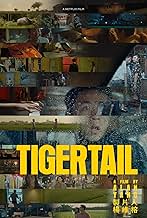VALUTAZIONE IMDb
6,6/10
3962
LA TUA VALUTAZIONE
Un operaio taiwanese lascia la sua terra natale per cercare opportunità in America, dove fatica a trovare una connessione bilanciando la famiglia e le nuove responsabilità in questo dramma m... Leggi tuttoUn operaio taiwanese lascia la sua terra natale per cercare opportunità in America, dove fatica a trovare una connessione bilanciando la famiglia e le nuove responsabilità in questo dramma multi-generazionale.Un operaio taiwanese lascia la sua terra natale per cercare opportunità in America, dove fatica a trovare una connessione bilanciando la famiglia e le nuove responsabilità in questo dramma multi-generazionale.
- Regia
- Sceneggiatura
- Star
- Premi
- 2 vittorie e 1 candidatura in totale
Queenie Yu-Hsin Fang
- Young Yuan
- (as Yo-Hsing Fang)
Kuei-Mei Yang
- Minghua
- (as Yang Kuei-Mei)
Lynn Masako Cheng
- Child Angela
- (as Lynn Cheng)
Che-Hao Chang
- Kuomintang Soldier #1
- (as Che Hao Chang)
Recensioni in evidenza
In director Alan Yang's Emmy winning speech for Master of None in 2016, he said that despite there being 17 million Asian-Americans in this country, there was still a lack of representation in television and film. Tigertail is undoubtedly a step towards that direction.
Set over four different time periods across both Taiwan and New York, Tigertail is an immigrant story at heart. When Pin-Jui (played by Tzi Ma) is still a teenager, he reluctantly enters into an arranged marriage as a means to provide money for his ailing mother. He leaves behind his girlfriend and emigrates to New York. After a few years, Pin-Jui and his wife have a daughter of their own, of whom Pin-Jui has a fractured relationship.
From one angle, this immigrant story is formulaic. Parents, with nothing in common, struggle in a foreign land for the sake of their children. But from another angle, Yang shows us nuances and subtleties that demand a deeper inspection. The miniature piano that Pin-Jui scavenges for his wife but remains unplayed over the years. Pin-Jui repeatedly opening and closing the metal gate to his small grocery store through the seasons, showing the passage of time. Pin-Jui's daughter crying in the backseat after being scolded after a piano recital gone wrong.
One nuance that reverberates throughout the film is language. The film features three different languages: English, Mandarin Chinese, and Taiwanese Hokkien. Each language represents a different generation: Pin-Jui's mother exclusively speaks Taiwanese, Pin-Jui primarily speaks Chinese, and Pin-Jui's daughter speaks English. For the entire film, all of the dialogue between Pin-Jui and his daughter is in English. It's not until her father brings her to where he grew up and finally tells her the story of his upbringing: How he gave up his life for another. It's only here, in the final moments of the film where she speaks Chinese for the first time and asks, "What was her name?"
Covering four different time periods in the span of a mere ninety minutes was an ambitious task, and for that reason, the movie feels particularly rushed. Perhaps more attention could have been placed on capturing the relationship between the father and daughter: This has always been a core piece of what it means to be a child of immigrants. Furthermore, the stitching of scenes across different time periods don't always translate well to Pin-Jui's character development as an adult. It's only until the final fifteen minutes of the film do you see this unfold.
Overall, Yang is able to capture the right emotions in his directorial debut and tells a classic story in his own way. The subtleties, reflecting both an Asian-American heritage and relatable familial scenes establish a fulfilling level of depth to the film. True to his own words, you can't help but wonder what Yang will do next.
Set over four different time periods across both Taiwan and New York, Tigertail is an immigrant story at heart. When Pin-Jui (played by Tzi Ma) is still a teenager, he reluctantly enters into an arranged marriage as a means to provide money for his ailing mother. He leaves behind his girlfriend and emigrates to New York. After a few years, Pin-Jui and his wife have a daughter of their own, of whom Pin-Jui has a fractured relationship.
From one angle, this immigrant story is formulaic. Parents, with nothing in common, struggle in a foreign land for the sake of their children. But from another angle, Yang shows us nuances and subtleties that demand a deeper inspection. The miniature piano that Pin-Jui scavenges for his wife but remains unplayed over the years. Pin-Jui repeatedly opening and closing the metal gate to his small grocery store through the seasons, showing the passage of time. Pin-Jui's daughter crying in the backseat after being scolded after a piano recital gone wrong.
One nuance that reverberates throughout the film is language. The film features three different languages: English, Mandarin Chinese, and Taiwanese Hokkien. Each language represents a different generation: Pin-Jui's mother exclusively speaks Taiwanese, Pin-Jui primarily speaks Chinese, and Pin-Jui's daughter speaks English. For the entire film, all of the dialogue between Pin-Jui and his daughter is in English. It's not until her father brings her to where he grew up and finally tells her the story of his upbringing: How he gave up his life for another. It's only here, in the final moments of the film where she speaks Chinese for the first time and asks, "What was her name?"
Covering four different time periods in the span of a mere ninety minutes was an ambitious task, and for that reason, the movie feels particularly rushed. Perhaps more attention could have been placed on capturing the relationship between the father and daughter: This has always been a core piece of what it means to be a child of immigrants. Furthermore, the stitching of scenes across different time periods don't always translate well to Pin-Jui's character development as an adult. It's only until the final fifteen minutes of the film do you see this unfold.
Overall, Yang is able to capture the right emotions in his directorial debut and tells a classic story in his own way. The subtleties, reflecting both an Asian-American heritage and relatable familial scenes establish a fulfilling level of depth to the film. True to his own words, you can't help but wonder what Yang will do next.
"Tigertail" is one of the better films I've seen lately. A moving yet quiet film that offers viewers a look inside immigrant life.
.
In this drama, a Taiwanese factory worker leaves his homeland to seek opportunity in America, where he struggles to find connection while balancing family and newfound responsibilities.
.
I found this film to be more compelling and resonant than 2019's "The Farewell". "Tigertail" had my full attention from the start until the very bittersweet end. You get to see a completely other side of writer/director Alan Yang ("Master Of None") and he leaves filmmaker imprints as he goes along. The performances in this film are great as well; the iconic Tzi Ma ("The Farewell", "Arrival") really gets to show off his acting chops here playing a quiet but struggling man. You feel his pain and conflict throughout. I didn't think I'd enjoy "Tigertail" as much as I did and I think you should definitely stream it on Netflix.
.
Follow @snobmedia for more reviews!
That closing shot.
As a story about someone letting it all kinda get away from them (themselves, their desires, their ability to connect emotionally) not due to some significant event but just through their everyday decisions and the passage of time, it's pretty depressing. But also funny and beautiful at times.
It made me real sad despite having no connection to the material or the immigrant experience.
As a story about someone letting it all kinda get away from them (themselves, their desires, their ability to connect emotionally) not due to some significant event but just through their everyday decisions and the passage of time, it's pretty depressing. But also funny and beautiful at times.
It made me real sad despite having no connection to the material or the immigrant experience.
Now available on Netflix, this multi-generational drama follows a Taiwanese factory worker who leaves his homeland to seek opportunity in the US, where he struggles to find connection while balancing family and newfound responsibilities.
The two aspects I loved the most about Tigertail were the score (which sounded amazing and perfectly fit the tone) and the non-linear storytelling that kept the story interesting to follow. I, also, liked how they shot part of the movie on film - when the lead character was young - as it gave it more personality. Other than that, I found Tigertail to be a rather by-the-books drama with interesting but, perhaps, underdeveloped commentary on immigration. The movie is quite short and never feels dull or boring, though, so I would recommend it to fans of this kind of dramas.
6/10 or 7/10 (can't decide)
The two aspects I loved the most about Tigertail were the score (which sounded amazing and perfectly fit the tone) and the non-linear storytelling that kept the story interesting to follow. I, also, liked how they shot part of the movie on film - when the lead character was young - as it gave it more personality. Other than that, I found Tigertail to be a rather by-the-books drama with interesting but, perhaps, underdeveloped commentary on immigration. The movie is quite short and never feels dull or boring, though, so I would recommend it to fans of this kind of dramas.
6/10 or 7/10 (can't decide)
A touching father daughter relationship at the core of it. A bit of a downer but it redeemed itself with a heartfelt ending
The 'Tigertail' Cast Name Their Asian Cinema Picks
The 'Tigertail' Cast Name Their Asian Cinema Picks
Tigertail writer/director Alan Yang is joined by stars Tzi Ma and Christine Ko to name some of their favorite films for you to check out in Asian Cinema.
Lo sapevi?
- QuizAll of the flashback scenes were shot on 16mm film while all the present day scenes were shot on digital.
I più visti
Accedi per valutare e creare un elenco di titoli salvati per ottenere consigli personalizzati
- How long is Tigertail?Powered by Alexa
Dettagli
- Tempo di esecuzione
- 1h 31min(91 min)
- Colore
- Proporzioni
- 2.39 : 1
Contribuisci a questa pagina
Suggerisci una modifica o aggiungi i contenuti mancanti







































